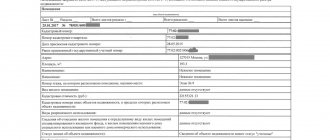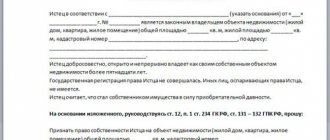Methods of deprivation of property rights
Deprivation of ownership of real estate very often becomes the subject of legal disputes. Each owner should know his rights to own property in order to avoid possible problems. Let's consider in what cases a person can be deprived of the right to own real estate. Let's look at the instructions and methods for depriving property rights.
In accordance with the current Constitution of the Russian Federation, it is possible to deprive the owner of his right to an apartment only by a court decision. No other authority has the power to deprive a person of ownership of his property. Most often, the subject of dispute is real estate. A person may not live in the living space or be registered on it, but this does not prevent him from being the owner of this premises.
The basis for deprivation of property rights may be confiscation and foreclosure of property
. Real estate can be taken away by a court decision or taken away for debts. For example, if we are talking about an apartment purchased with a mortgage. It is the property of the bank and in case of violation of the terms of the contract by the borrower, the housing becomes the property of the bank.
But banks take such measures only as a last resort. It is much more profitable for them to renegotiate the terms of the mortgage loan. In addition, you can only take away an apartment in which one of the owners is a minor child if the guardianship authorities give their consent. It is also considered a prerequisite that the child must have other housing suitable for living.
In some cases, ownership of real estate is taken away in favor of the state. For example, this may happen if this object is needed to accommodate objects of municipal or state significance. In this case, the owner will be paid compensation commensurate with the market value of the property.
The question often arises about the eviction of utility
. Please note that in this case it is impossible to forcibly evict a person from a residential premises. He can only voluntarily give up the apartment to pay off the accumulated debt.
When an inheritance is made public, the right to property passes to the heirs determined by law or by this very will. In the event that there is a testamentary refusal, then in addition to the persons referred to in the will, the obligatory share must go to disabled first-degree relatives, if any.
These provisions are enshrined in the current Civil Code. To deprive any of the heirs of the right of ownership
on real estate, it is necessary to take certain actions in advance.
The testator has the right to dispose of his property during his lifetime and indicate the persons to whom it will be transferred in the will. In this case, after the death of the owner, inheritance of his property will occur according to the will. If at the time of death the testator had children, a spouse or parents recognized as disabled, then they are required to share the inheritance.
A way to deprive an heir of ownership of an apartment may be the option of selling the apartment or donating it.
. To ensure that the transaction is not invalidated after the death of the testator, the option of buying and selling property is preferable, since the gift agreement is easier to challenge in court.
Procedure
Since the procedure for going to court is strictly regulated, it is necessary to comply with all the requirements of the legislator and follow the following algorithm of actions:
- try to conclude a pre-trial agreement;
- collect the necessary documents;
- draw up a statement of claim based, among other things, on the collected information and legal norms;
- send it with the appropriate number of copies (one for the court and each defendant) and a package of documents to the court of general jurisdiction;
- participate in court proceedings, bring complaints, file petitions, protect your interests by any legal means and prove the validity of the claim;
- if you receive a decision not in your favor, appeal it to a higher court;
- upon receiving a positive decision, pay compensation to the owner of part of the apartment (for this you can take out a mortgage to purchase the share);
- register your right to own property with the authorities of Rosreestr (possible through the MFC);
Expert opinion
Vasiliev Viktor Stanislavovich
Lawyer with 10 years of experience. Specialization: civil law. Member of the Bar Association.
If you recognized the share as insignificant and bought it and became the sole owner of all the apartments, then read our article “How to combine shares in an apartment for one owner.”
Statement of claim
It should contain the following information:
- name of the application;
- the judicial authority to which the petition is sent;
- the most accurate personal and contact information of the plaintiff and defendant;
- information about the property as a whole and about the disputed share (location, size);
- circumstances of the emergence of property rights;
- information about attempts to resolve the dispute out of court;
- an indication of why you believe that the share of the other co-owner is really insignificant;
- claim;
- a list of documents that are attached to the claim and indicate the legality of your claims;
- a list of persons whom you wish to hear in court as witnesses;
- date of compilation, personal signature of the applicant.
It is best to entrust the preparation of a statement of claim to a professional lawyer. After all, it is in the field of housing law that there are many nuances that you need to know so that the application in court is not left without consideration.
Required documents
The following documents must be attached to the application:
- a copy of the applicant's passport;
- an extract from the house register about registered persons;
- extracts from the Unified State Register of Real Estate about the property;
- technical documentation;
- evaluation report;
- receipt of payment of state duty;
- documentary evidence of the validity of the requirements (extract on non-payment of housing and communal services, extract from the Unified State Register of Real Estate on the availability of other housing for the defendant).
It is also necessary to confirm to the court the availability of funds for forced redemption. The funds are transferred to the court account. If payment is not made, the court will refuse to consider the claim.
In addition, it is necessary to attach a procedure for calculating the value of the defendant’s share. This cannot be done by eye. You need to hire a specialist from a specialized appraisal organization. Based on the results of the report, the value of the disputed share is revealed.
Some documents can be presented in court at the request of the judge.
Deadlines
In order to familiarize yourself with the claim and documents, the judge is given 5 days from the date of receipt of the application. After this, he makes a decision to accept it for proceedings or leave it without consideration and return it to the plaintiff for amendments.
The trial itself can drag on for a period of several months to several years. It all depends on the circumstances, the position of each party, the need for research and examination.
Registration of property rights in the Unified State Register of Real Estate will take another 7 days.
Loss of property rights due to mismanagement
At first glance, this may seem very doubtful, but mismanagement and negligence can serve as valid reasons for the eviction of a tenant, both from public housing and from an apartment owned by them.
This issue is regulated by the Civil Code, namely article number 293
. It implies the termination of ownership of unmanaged housing and describes the procedure for action in this situation.
If the owner of the apartment does not monitor its maintenance, does not carry out the necessary routine repairs, violates public order and disturbs neighbors with his behavior, then the authorized body must issue him a warning, which will indicate the time frame for carrying out the necessary work.
If the owner does not take any measures to eliminate the identified deficiencies, the administration files a claim in court. If the claim is satisfied, a decision will be made to sell the residential premises at auction. The funds received will be paid to the owner, minus the costs of home repairs, which the authorized body encouraged to do voluntarily.
Register now and get a free consultation from Specialists
Deprivation of property rights of mortgage debtors
An apartment purchased with a mortgage is the property of not only the buyers, but also the bank that issues the loan. This property can be seized even if the residents have no other living space. Therefore, the courts in most cases satisfy the claims of creditors and force the owners to sell real estate at auction.
The bank client, after selling the property, will receive the proceeds in his hands. Please note that the final amount will be issued minus the funds borrowed from the bank. Therefore, the client has the opportunity to use the remaining funds to purchase a smaller apartment.
Legal grounds for deprivation of ownership of a share in an apartment
This can only be done in a number of cases. Let's take a closer look at these situations:
- Voluntary consent of all shareholders. This is possible if all owners find a compromise solution that suits all shareholders.
- Deprivation of property rights based on a court decision. The reasons for going to court must be compelling, and the plaintiff must have grounds to demand the deprivation of property rights of one or all shareholders.
- Forced purchase of a small share in an apartment. This is the most real and common case, which occurs most often in practice.
Each person chooses which method to use to deprive ownership of a share individually, based on the current situation within the family. Most importantly, you must act according to the law, and for this you need to have good reasons for these actions.
How to deprive a share in a privatized apartment without consent
As mentioned earlier, in the case of a violation of the law by the shareholder or the appearance of serious debts, the second owner does not need to do anything and simply wait until part of the property goes up for auction. After this, it will be enough to purchase it based on the pre-emptive right. But with forced redemption the situation is somewhat different. Here you will have to go to court on your own, because there are simply no other interested parties in this dispute.
Procedure
Before doing anything, it is recommended that you try to come to an agreement with the owner of a small share. Firstly, if it is possible to conclude an agreement on terms that suit the parties, then no further action will be required and, as a result, the problem with the share will be resolved.
Secondly, even if it is known in advance that the second party will not agree to any conditions (or the conditions set by it will be unacceptable to the first party), this will still be considered as an attempt to resolve the problem out of court. And when considering the claim, it will be considered a plus for the applicant. After this you need:
- Collect evidence that the plaintiff actually has the right to compulsory redemption of the share.
- Prepare documents.
- File a claim.
- Pay the state fee.
- File a claim in court.
- Wait for the meeting and attend it.
- Receive a court decision in your hands.
- Wait for the decision to take effect.
- Act strictly in accordance with the decision.
Documentation
In addition to the statement of claim itself, a sample of which is presented below, approximately the following package of documents must be submitted to the court:
- Applicant's passport.
- An extract from the Unified State Register or any other similar document confirming ownership of a share in the apartment.
- A purchase and sale agreement, gift or any other document confirming the fact of receiving a share legally.
- Evidence that the applicant is correct.
- Receipt for payment of state duty.
Statement of claim
Expenses and taxes
The forced purchase of a share relates to property disputes and therefore the amount of the state duty directly depends on the value of this part of the real estate (Article 333.19 of the Tax Code of the Russian Federation).
Example : The share that is planned to be forcibly redeemed costs 150 thousand rubles. Based on this article, the state duty in such a situation will be 2% + 3200 rubles. The percentage is taken from the amount over 100 thousand rubles. Thus, the payment will be 3200+1000=4200 rubles.
In addition to the state duty, there are usually no additional payments at the stage of the court hearing. After registration of ownership of the new share, the tax and rent will logically increase slightly.
Deadlines
The length of the procedure largely depends on the applicant and, directly, the court. If a person does everything promptly and is actively involved in this issue, then the problem can be solved in about 2-3 months. Of these, the consideration of the case will take up to 2 months and another 1 month will have to wait until the court decision comes into force.
In most cases, it is incredibly difficult to deprive the owner of a share without his consent. Proving the fact that the share is insignificant and cannot be allocated in kind is only part, albeit the most difficult, of the entire procedure. During a free consultation, our experienced lawyers will clarify the most important and priority issues related to this topic. They are ready to act as representatives of the client, defending his point of view in court. As practice proves, this significantly increases the chances of making exactly the decision that the plaintiff needs.
FREE CONSULTATIONS are available for you! If you want to solve exactly your problem, then
:
- describe your situation to a lawyer in an online chat;
- write a question in the form below;
- call Moscow and Moscow region
- call St. Petersburg and region
Save or share the link on social networks
(
1 ratings, average: 5.00 out of 5)
Author of the article
Natalya Fomicheva
Website expert lawyer. 10 years of experience. Inheritance matters. Family disputes. Housing and land law.
Ask a question Author's rating
Articles written
513
- FREE for a lawyer!
Write your question, our lawyer will prepare an answer for FREE and call you back in 5 minutes.
By submitting data you agree to the Consent to PD processing, PD Processing Policy and User Agreement
Useful information on the topic
1
What does a document on privatization of an apartment look like?
As of [current_date format='Y'], as the main document...
1
How to evict your ex-wife from an apartment
Not all families live happily ever after; many get divorced. Behind…
Privatization of an apartment through the MFC
Privatization of an apartment is a complex and lengthy process, but for many...
Privatization of a garden plot
A garden plot of land, provided that a house is located on it, can...
2
Certificate of non-participation in privatization
The certificate of non-participation in privatization has now been replaced by an extract...
What does a privatized apartment mean?
Almost immediately after the collapse of the USSR, the era of privatization of state and...







